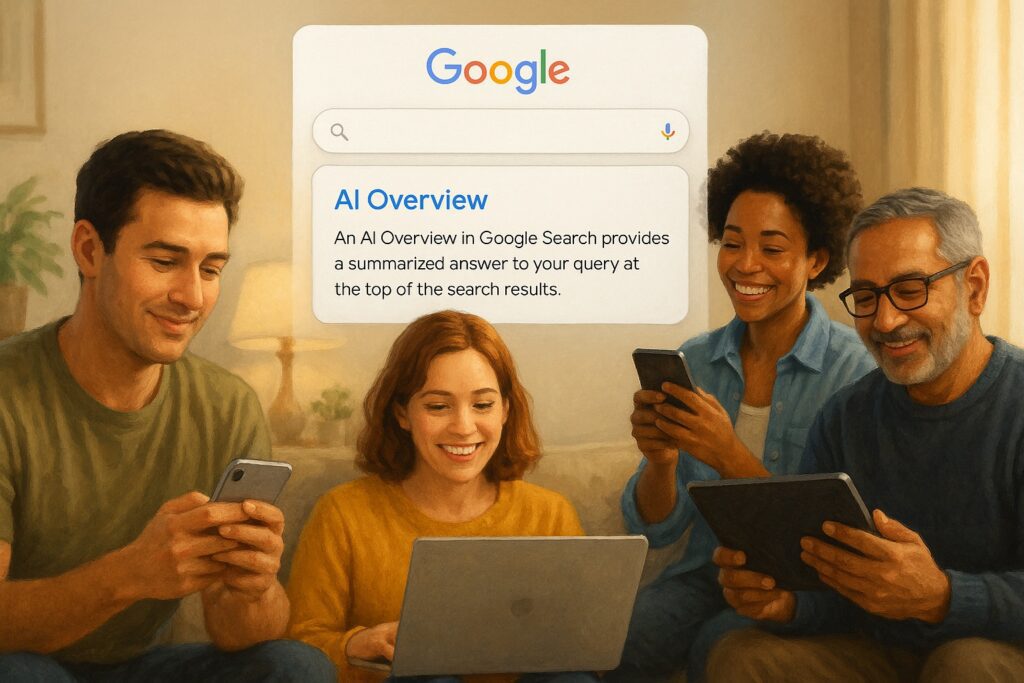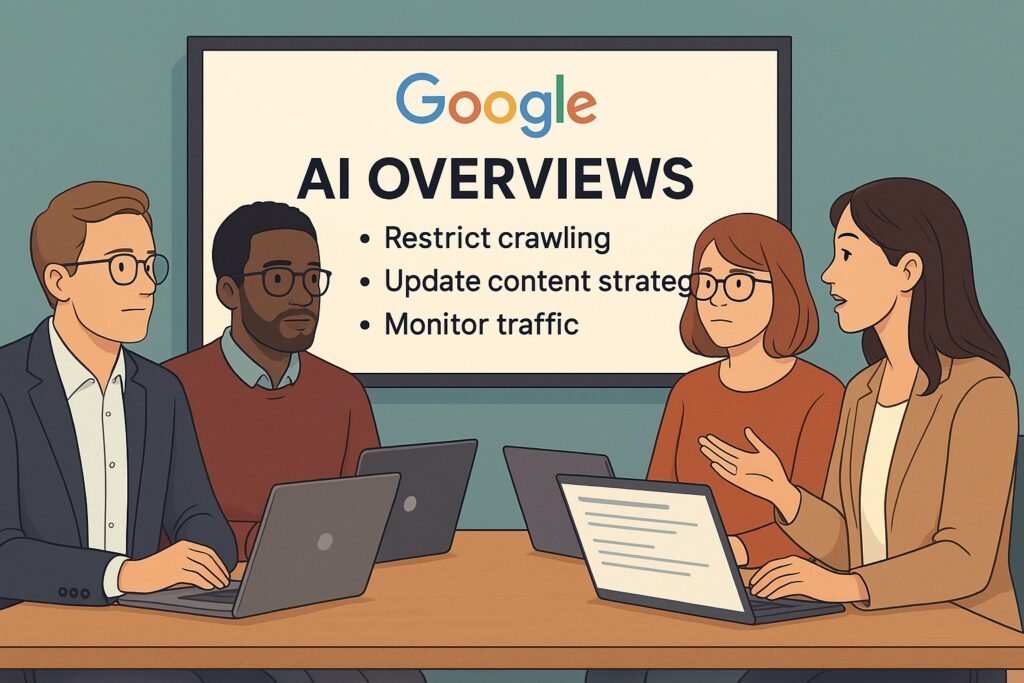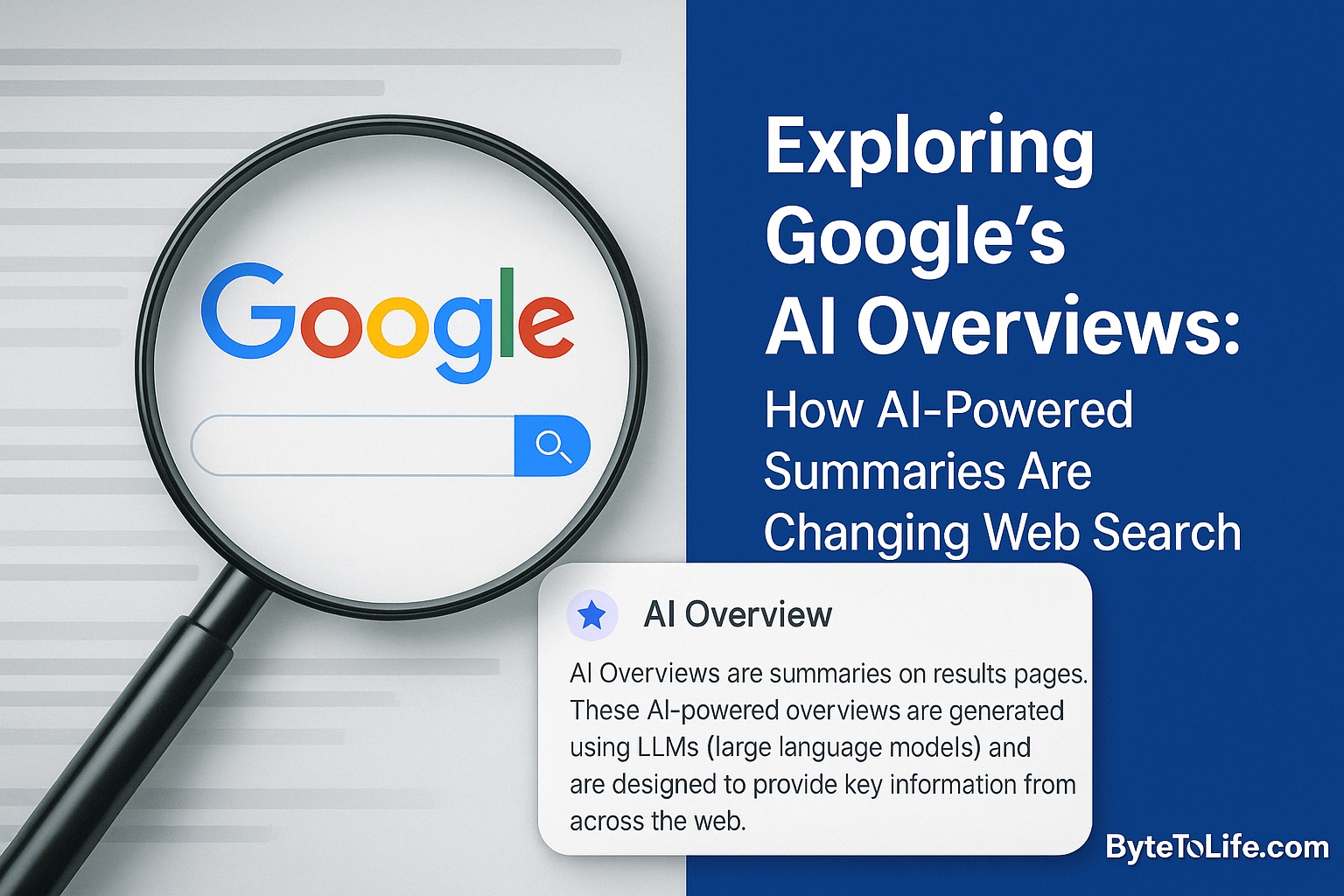In recent years, artificial intelligence has permeated nearly every digital experience we interact with. From AI-powered writing assistants to recommendation engines, intelligent systems are optimizing the way we consume content. Google, never one to fall behind in technological evolution, has introduced one of its most impactful updates yet — AI Overviews. This revolutionary change to its search engine results is not just an upgrade; it’s a complete rethinking of how we interact with information on the internet.
What Exactly Are AI Overviews?
AI Overviews are Google’s attempt to streamline the search process using generative AI. Rather than presenting a list of traditional search results, Google now uses large language models (LLMs) to generate a summarized answer to your query, often drawing from multiple web sources.
This feature began as part of Google’s Search Generative Experience (SGE), which was initially rolled out as an experimental option. In 2025, it is gradually being introduced more broadly under the branding “AI Overviews,” with features like “AI Mode” and even ad integration now being tested.
How Does It Work Behind the Scenes?
Google leverages its proprietary LLMs — likely enhanced versions of Gemini — to analyze billions of web pages in real time. These models are trained to:
- Understand natural language queries with nuance.
- Identify the most credible and relevant sources.
- Synthesize a coherent and trustworthy summary.
AI Overviews also include links to cited sources, enabling users to dive deeper if they choose. This semi-conversational system feels more like interacting with a digital assistant than a traditional search engine.
Benefits for Everyday Users

From the viewpoint of usability, AI Overviews introduce several helpful perks:
- Faster answers: Instead of skimming through multiple articles, you get a concise response instantly.
- Improved comprehension: Summaries often present the answer in plain language, even for complex topics.
- Convenient exploration: Many AI Overviews suggest follow-up questions, leading users through a deeper understanding of a topic.
Real-World Use Cases
Let’s say you search for “Is it safe to microwave Tupperware?” Rather than scrolling through blogs and forums, AI Overviews will instantly generate a safety summary, cite expert sources, and might even suggest what symbols to look for on containers. It’s quick, convenient, and focused on action-oriented answers.
Downsides and Emerging Concerns
Despite their advantages, AI Overviews come with a few significant caveats:
- Over-reliance on summaries: Users may stop clicking through to original sources, missing critical context.
- Risk of inaccuracies: Like all generative AI tools, hallucinations — or incorrect facts — can occur.
- Visibility loss for creators: Websites that previously received high traffic from search may see fewer visits if users no longer click on organic links.
Case Example: The Chegg Backlash
In early 2025, online education company Chegg saw a significant drop in organic traffic due to AI Overviews summarizing academic answers directly on the SERP. This prompted public debate about content ownership, licensing, and revenue-sharing with AI platforms.
How This Impacts SEO & Digital Strategy
The rise of AI Overviews is reshaping search engine optimization. It’s no longer enough to simply rank high on search results — you need to be selected as a source for the AI summary.
Updated SEO Strategies for 2025
- Focus on clarity: Use simple language and clear structure to improve your content’s chances of being cited.
- Use Q&A formats: Articles that answer specific questions are more likely to be picked for summaries.
- Optimize metadata: Proper title tags, meta descriptions, and schema markup are critical.
- Ensure credibility: Citing sources and having author bios adds to your trustworthiness.
Comparing Traditional Search vs. AI Overviews
Let’s take a side-by-side look:
| Traditional Search | AI Overviews |
|---|---|
| 10+ blue links per query | 1 summarized paragraph with sources |
| User chooses which link to click | AI chooses which sources to cite |
| SEO-heavy competition | Quality and clarity-oriented selection |
What’s Coming Next: AI Mode & Personalized Search
In its ongoing experiments, Google is testing “AI Mode” — a toggle that allows users to experience fully AI-driven search results. This includes:
- Entirely AI-written answers
- Fewer or no traditional links
- Personalized tone, language, and sources based on user history
- Monetized answers with integrated ads (coming soon)
Potential Impacts of AI Mode
- Shift in advertising budgets toward summary placements
- Increased pressure on creators to adapt fast
- Need for new analytics tools to track AI traffic
How Content Creators Can Thrive
It’s not all doom and gloom. Smart creators stay in the lead by continuously evolving their approach. Here’s how:
- Double down on authenticity and experience-based content.
- Target specific search intents rather than broad keywords.
- Use structured FAQ sections to boost AI crawlability.
- Create multi-format content: video + blog + infographics.
How Publishers Are Responding to AI Overviews

Digital publishers have had mixed reactions to the emergence of AI Overviews. On one hand, there is optimism about the potential to reach a wider audience through featured citations. On the other hand, many fear the loss of direct website traffic and revenue.
Major outlets such as The New York Times and The Wall Street Journal have publicly discussed their strategies to ensure their content is either licensed properly or excluded from AI datasets when appropriate. Other platforms are experimenting with new formats to stay relevant in an AI-first search landscape.
Examples of Industry Response
- Blocking AI crawlers: Some publishers have added directives in their robots.txt files to prevent AI training.
- Licensing negotiations: Talks continue between AI firms and news publishers over content rights.
- Developing human-centered content: Stories and perspectives that AI can’t easily replicate are being prioritized.
Is This the End of Organic Search?
While some fear AI Overviews may kill traditional SEO, it’s more accurate to say it’s transforming it. Organic search isn’t going away — it’s simply transforming. Creators who adapt early can even benefit from this shift by becoming preferred sources for AI summaries.
Hybrid Strategy for 2025 and Beyond
Here’s how to blend old and new SEO strategies:
- Maintain high-quality evergreen articles with clear structure.
- Integrate conversational long-tail queries in your posts.
- Use internal linking smartly to increase crawlability and engagement.
- Provide expert insights that AI may quote or summarize.
Technical Challenges Behind AI Overviews
While the user-facing side of AI Overviews looks smooth, the backend involves a complex blend of artificial intelligence, natural language processing (NLP), and real-time data processing. One key challenge is ensuring factual accuracy — generative AI is prone to “hallucinations,” where it generates convincing but incorrect information.
Google has been actively working on reducing these errors by:
- Cross-referencing multiple credible sources before generating an answer.
- Using feedback loops from users to correct mistakes over time.
- Integrating real-time data monitoring to avoid outdated information.
How Niche Content Creators Can Win in the AI Era
If you’re a solo blogger, podcaster, or niche content creator, don’t be discouraged. AI Overviews may seem like a threat, but they actually reward specificity and depth — areas where smaller creators often thrive.
Strategies for niche success include:
- Double down on unique expertise: Share insights, experiences, or case studies no AI can replicate.
- Use structured formats: Lists, FAQs, tutorials, and guides are ideal for AI parsing.
- Update regularly: AI systems prioritize the most current information for better precision.
- Cross-platform promotion: Link your blog to YouTube, newsletters, or social media to diversify visibility.
Predictions: Where AI Search Is Headed in the Next 3 Years
Looking ahead, here’s what we expect to see in the evolution of AI-powered search:
- Increased personalization: AI will tailor responses to individual user preferences and habits.
- Greater transparency: Users may gain options to see how AI derived a summary and which sources were used.
- Voice-first experiences: AI Overviews will likely integrate with Google Assistant, evolving toward a more conversational experience.
- More regulation: As legal and ethical concerns grow, expect stricter AI governance and licensing models.
Frequently Asked Questions (FAQ)
Google AI Overviews are smart summaries powered by large language models (LLMs) that provide quick, AI-generated answers to search queries. They aim to reduce the time needed to sift through multiple websites by giving concise overviews directly on the search results page.
AI Overviews shift the focus from link-ranking to content quality. Creators must now write content that’s easily understood, well-structured, and directly answers user queries to be cited by the AI. It also means less direct traffic from search, prompting a rethink of content strategy.
Yes. Publishers can use directives in their robots.txt file or apply metadata like noai to restrict AI models from accessing or using their content. However, this may also affect visibility in traditional search.
No. Although Google uses multiple sources to improve accuracy, AI models can still produce hallucinations or outdated summaries. Users are encouraged to check source links and context before relying on summaries for critical information.
AI Mode is an experimental feature being tested by Google that allows users to experience fully AI-generated search results. This includes summaries, follow-up questions, and potentially fewer or no traditional blue links, creating a more interactive and personalized search experience.
Conclusion
AI Overviews are here to stay — and they’re only getting more powerful. While this evolution poses real challenges, it also creates new opportunities. By understanding how this system works and aligning your content strategy accordingly, you can remain visible, valuable, and ahead of the curve.
Want more in-depth insights into AI tools and strategies? Explore our latest content:
- What Is AI Mode in Google Search?
- How AI Tools Are Transforming Daily Productivity
- Top AI Writing Tools in 2025
ByteToLife.com — Navigating the future of AI, one byte at a time.
Resources & Further Reading
Want to learn more about how AI is transforming search experiences? Here are some reliable resources:



